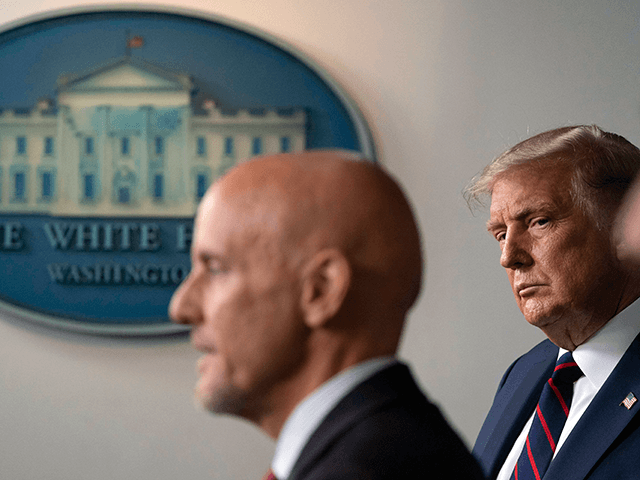Distribution of the Chinese coronavirus vaccine could begin by the third week of this month, Vice President Mike Pence told governors this week, echoing Gen. Mark Milley, the Chairman of the Joint Chiefs of Staff and other top officials.
Their comments suggest U.S. regulators — who say they feel the pressure after the United Kingdom became the first country to approve a vaccine and could be dispensing shots within days — will hastily approve an emergency use authorization (UAE) for the first Americans to get a shot by the end of the year.
“We strongly believe the vaccine distribution process could begin as soon as the week of December 14,” Pence declared during a conference call with governors on Monday, audio obtained by CBS News revealed. “With this morning’s news that Moderna is joining Pfizer in submitting an Emergency Use Authorization (EUA), we continue to be on pace.”
Gen. Mark Milley, the Chairman of the Joint Chiefs of Staff, declared on Wednesday that as the coronavirus vaccine’s rollout approaches, the military’s role in “Operation Warp Speed” has intensified.
Although unable to provide a specific timeline, the nation’s highest-ranking military officer proclaimed the Pentagon is prepared to begin distributing vaccines within “the next week or two or three,” echoing Pence.
On Tuesday, U.S. Food and Drug Administration Commissioner Stephen Hahn would not explicitly commit to the mid-December timeline, but said it was “possible” the agency could approve Pfizer’s vaccine against COVID-19 (coronavirus disease) by that time “if everything falls into place, but that it may take longer,” Reuters reported.
For months, Trump administration officials said that the U.S. would approve a vaccine by late this year, noting that it would not be available for widespread use until later next year.
On Tuesday, Moncef Slaoui, the chief science advisor for President Donald Trump’s Operation Warp Speed, said the U.S. could inoculate its entire population by June, adding that there could be enough doses to inoculate 20 million by the end of the year.
Operation Warp Speed is a multi-billion dollar Trump administration public-private partnership that has benefitted the development of the vaccine candidates and therapeutics.
American could “have this pandemic under control in the second half of 2021,” Slaoui added in an online event sponsored by the Washington Post.
The comments from Pence and. Gen. Milley came a day before a U.S. Centers for Disease Control and Prevention (CDC) panel advised, not mandated, states to administer the first batch of shots to roughly millions of health-care employees and others vulnerable to contract the disease, including residents and staff of nursing homes and other long-term care facilities.
On Wednesday, the United Kingdom cleared for emergency use a U.S. vaccine frontrunner developed by United States drugmaker Pfizer and Germany’s BioNTech on American soil with the help of domestic tax dollars.
The U.K. insists that “no corners have been cut.”
Some outside observers, namely the South African Broadcasting Corporation (SABC), pointed out that the move may push U.S. regulators to move swiftly in approving Pfizer-BioNTech’s UAE request made back on November 20.
However, the U.S. Food and Drug Administration (FDA) has defended its decision to prolong the Pfizer vaccine’s approval and not plan any changes.
Besides Pfizer, American biotechnology company Moderna also asked the FDA for UAE approval on November 30.
FDA officials have scheduled December 10, which could result in a UAE authorization by the second or third week of this month.
The FDA has set aside December 17 to consider Moderna’s application.
Despite the U.K. green lighting the shot, American scientists need another week to analyze data because they review it more “robustly” than anyone else, FDA Commissioner Stephan Hahn said.
“We have to go through it very carefully. Our processes are so robust,” he told a Facebook Live event sponsored by CBS News Wednesday as he tried to explain why the FDA is taking so long to approve the Pfizer vaccine, particularly after a top U.s. ally like Britain has already done so.
“We feel the urgency of the situation,” he conceded. “We feel the pressure to get it done. We’re committed to the data and science, and that will guide us.”
Without criticizing British regulators, he indicated the FDA was taking extra care to analyze the data.
Sources have reportedly told several news outlets Trump and other White House officials are angry that an overseas country approved a vaccine developed in America before the U.S.
In the middle of the clinical trials, the FDA issued new guidelines, a move that appears to have succeeded in delaying the approval of a life-saving vaccine before Election Day as promised by Trump.
The move came amid complaints from Democrats and their leftist allies in the corporate media that politics plagued the effort to develop a vaccine.
Some Democrats expressed concerns that approving a vaccine before November 3 could help Trump’s chances at the ballot box.
There are currently no vaccinations for any coronaviruses in humans.

COMMENTS
Please let us know if you're having issues with commenting.